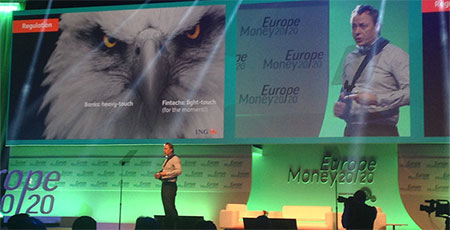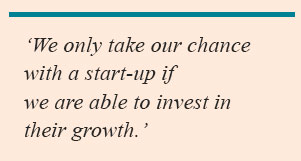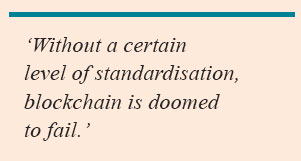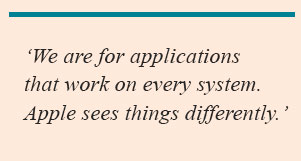Money 20/20 Europe interview
18 april 2016
ING CEO Ralph Hamers was interviewed recently by the Dutch business daily het Financieele Dagblad at the large fintech conference Money 20/20 in Copenhagen. He was one of the keynote speakers and spoke about ING’s innovation vision and how the bank works with fintechs. His main message was that clients determine which banking solutions they want to use.

Fintech: Friend or Foe of the Banks? Ralph Hamers delivering his keynote speech at Money 20/20 in April in Copenhagen.
Below is the complete translated article from het Financieele Dagblad, published on 15 April 2016. The original Dutch article is also available as a PDF for download.
‘I see fintech as an opportunity, a way to change things’
ING Group CEO Ralph Hamers is betting big on collaboration with innovative start-ups and new technologies for open banking systems. He sees great prospects for automated financial advice.
Rutger Betlem
Amsterdam
The payments landscape is set to change rapidly in the years to come. The digital wallet for mobile phones is on its way. Providers of financial services are experimenting with blockchain technology: improved security via decentralised data management based on the Bitcoin model. And the introduction of the revised EU Payment Services Directive (PSD2) will open the payments market to new players, making payment data no longer the exclusive domain of the banks. That provides a world of opportunity for innovative fintech start-ups, with more innovation and greater choice for consumers in the offing.
Ralph Hamers, ING Group CEO, looks forward to the introduction of the European regulations around PSD2, probably in January 2018. The bank has been experimenting with the possibilities in those European markets that already have an open banking system, such as Spain, where ING supports the Kabbage lending platform.
Innovation need not always come from a bank, he says. If a consumer wants to use products from another bank within the ING Bank platform – why not? ‘The single-supplier concept is outdated’, says the CEO in an exclusive interview with Het Financieele Dagblad. ParaMara, the digital wallet that ING uses in Turkey, is a good example. ‘ParaMara is an open platform. I see that as a healthy development.’ He is convinced that only by embracing open technology can the bank remain the central partner for doing business.
ING is betting big on collaboration with start-ups. How do you decide who to team up with? How exciting to work with what could grow to become the Facebook of the financial world!
‘If these companies can provide what makes Facebook so powerful, I am happy to have them in our system. We work actively with forty innovative players. I see fintech mainly as an opportunity, a way to change things that may have been done the same way for years and years, but not necessarily the best way.
All the same, we are extremely selective in our choice of partners. The aim of innovation is to give consumers more control over their finances: enabling them to sort out a lot of things themselves, yet with the right advice. That is the focus of our approach. If a technology does not advance this principle, it’s no good to us. No matter how attractive some companies may be.’

Care to elaborate?
‘The great thing about technology and data is that there’s still so much we don't even know that we can bring to our customers. Processes which run like molasses today can be made much easier, faster and more efficient. Take biometric techniques and new authentication methods, for instance. Soon, customers will no longer have to go to a physical point to identify themselves. Right now our priority is on innovation in payments. That experience determines what customers think about the bank. It is a misconception to think that customer contact takes place in physical bank branches.
That is much more intense and frequent online. We must take what we learn about customers online and use that to understand and serve them better. Such as tailored advice and the aggregation of different services. That certainly does not always need to be an ING product. The single-supplier concept is outdated. More than ever before, customers come first. Only then can you remain their central partner for doing business. Roboadvice [automated financial advice – ed.], SME loans and consumer loans are other areas where we see potential. It may seem like quite a list, but there are plenty of technologies that we are consciously not looking at because they do not fit in with our core business.’
How is the match made between a start-up and a major bank?
‘It starts with commitment. If you are not willing to invest the time and money, they will find someone else. It’s important to sit down together at an early stage and work together intensively. And we exercise restraint. ING is not one to overindulge on collaborations.
If we decide to take our chance with a start-up, we are serious and able to invest time in their growth. We choose carefully. We look for partners solely in the areas I already mentioned. Start-ups are always set up outside our own organisation. After all, you have to let a start-up be a start-up.’
Are the European regulations around PSD2 a threat to the bank?
‘Only for banks that cannot keep up with the changes. We have been busy testing new techniques in those markets that already have an open banking system. In Spain we work with Kabbage, for instance. A business can arrange funding from this lender in a matter of ten minutes. Without PSD2 that process takes two weeks. Kabbage is more than just looking at the data kept by other banks.
We also consider credit scores, for instance, and analyse the company's social media activity. PSD2 can spawn a lot of new services. If Kabbage in Spain is successful and carefully tested, we will be ready to take it to other countries.’
Is everyone going to make the deadline?
‘I have no idea. They could start a lobby in the course of the year to move back the deadline. But we don't expect so. It's the law. We have to obey it.’

How do you see the developments within blockchain?
‘We are the only Dutch bank to take part in R3, the international consortium of large banks. By now there are forty of us engaged in the development of blockchain applications. The technology makes it possible to grow globally from your existing, local business.
Too much is still done on paper in the financial world today. With blockchain, that's no longer necessary. And it will make the financial system safer.
But we are not there yet. To make blockchain work worldwide, we need a certain level of standardisation. Without standardisation, blockchain is doomed to fail.’
What is ING's approach to Apple Pay compared with other platforms?
‘It is not our job to decide which technology our customers should use, but we're all for applications that work on all devices. Apple sees things differently. In that case we do what customers want. And customers want to use Apple Pay. We simply favour a different approach.’

Apple Pay is one of many new payment methods. How far are you with the ‘smart wallet’?
‘There aren't so many around yet, to be honest. In Turkey we have ParaMara. That’s the only digital wallet we offer right now. It’s an open platform; competitors’ bank cards also work on ParaMara.
I see that as a healthy development. As a bank, you have to support customers with what's the right technology at that moment. If they find it convenient to have five different payment systems on their phone, then that's what they should do. We are not in it for the money on the transactions side. That income is nil. Ultimately, the retailers will decide which wallet wins.
It's not about the payment service but rather everything around it, such as award programmes, loyalty campaigns and special offers. The digital wallet is nothing more than a new way to engage with customers.’
Innovation Bootcamp

An initiative to stimulate innovation from within the bank. Employees submit plans for their own start-up. Those with the best entries get six months to develop their idea. ING puts employees in a start-up accelerator programme during that period. There they are mentored to grow their idea into a business.
Kabbage

Provides loans to small businesses and consumers via an automated platform. The US start-up has teamed up with ING in the Spanish market. Kabbage processes loan applications in a matter of minutes. The company also weighs up soft factors, such as the number of social media likes.
Twyp

A free phone application for transferring money to friends. Payments are made from a list of contacts via the mobile phone. Twyp has more than 260,000 users in Spain and the Netherlands and is growing fast. The application, a kind of digital wallet, uses ING's systems but is suitable for any bank.
WeLab

This Chinese lending platform, in which ING has taken a stake, is an up-and-coming company in the Chinese financial world. Consumers and businesses can easily borrow and set aside money via the app and the website. The online lending platform with 2.5 million customers uses big data for a quick review of online credit scores.
ParaMara

ING’s first experience with the ‘digital wallet’— electronic payment via mobile phone. ParaMara is active in Turkey. The technology is completely open. Besides ING cards, customers can use cards from all banks on the platform. In Poland, ING subsidiary Bank Śląski is experimenting with its own version — ING Digital Wallet.
© Het Financieele Dagblad
